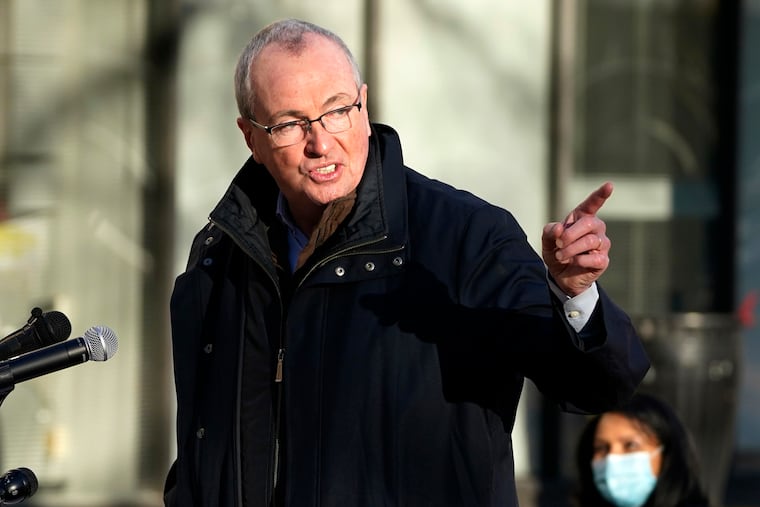N.J. Gov. Murphy announces new climate office and $100M to electrify ports, buses
New Jersey Gov. Phil Murphy on Tuesday announced $100 million to electrify state owned diesel vehicles including buses, and created an Office of Climate Action.

New Jersey Gov. Phil Murphy announced Tuesday a trio of environmental actions, including the release of $100 million toward electrification of buses and port areas, and the creation of a climate office and a green economy council.
The funds to move toward battery-powered buses for New Jersey Transit and schools, as well as garbage trucks, and cargo areas comes from a $41 million settlement with Volkswagen over selling vehicles that emitted more pollution than claimed, and $60 million in revenue raised through the Regional Greenhouse Gas Initiative, a multistate program designed to reduce emissions through market-based initiatives.
Murphy, who made the announcement in Newark, did not specify how many vehicles would be either purchased, converted, or retired.
“These projects ... show the sheer breadth of transformation ahead of us,” he said.
In addition, the governor signed executive orders creating an Office of Climate Action and Green Economy, which will be run by his senior policy adviser Jane Cohen.
The office will oversee creation of the Green Economy Council, which will be cochaired by acting Department of Environmental Protection Commissioner Shawn LaTourette, Board of Public Utilities President Joseph Fiordaliso, and Department of Labor and Workforce Development Commissioner Robert Asaro-Angelo.
The governor’s wife, Tammy Murphy, will serve as honorary chair. According to her bio, she currently serves as secretary of the Climate Reality Action Fund, an nonprofit founded by former Vice-President Al Gore.
The council will also include representatives from business, labor, utilities, academia, and environmental justice communities. It will craft a strategy to drive the green economy with economic justice, and provide support for workers displaced by the transition.
Murphy said environmental justice is a priority, and noted, for example, Newark, which he said “suffers disproportionate effects of emissions and pollution.” The city will get $1 million toward electric garbage trucks, as well as $7 million for medium- and heavy-duty cargo handling equipment.
“There is no denying that we have a lot on our plate right now,” Murphy said, citing COVID-19 and its economic fallout. “But climate change is a reality we must face, not with fear and apprehension but with an understanding that the clean energy economy is a once in a generation opportunity for New Jersey.”
Environmental organizations hailed the actions.
“As a resident of Newark and mother of three asthmatic children, we are on the front lines of overlapping health, economic, racial injustice, democratic and climate crises, so I’m glad to see Governor Murphy focusing funding and attention on environmental justice, green jobs, and climate action today,” said Kim Gaddy, an organizer with Clean Water Action.
Jeff Tittel, director of the New Jersey Sierra Club, called the $100 million a “critical ... downpayment” toward electrification of transportation.
Hayley Berliner, with Environment New Jersey, called the announcement a “win for our lungs and our climate.” Berliner said she was glad to see funding toward e-mobility projects, which could include anything from ride sharing to electric scooters and bikes. Environment New Jersey is involved in an e-mobility project in Trenton that would include an electric car-sharing or ride-hailing service.
Here’s how the $100 million breaks down (numbers are rounded):
$36 million to electrify port, cargo handling, and other equipment in port and industrial areas.
$15 million toward NJ Transit bus electrification.
$15 million in additional funding toward various initiatives.
$13 million in grants for electric school buses and shuttle buses in low-income communities.
$9 million in grants for electric garbage and delivery trucks in designated environmental justice communities.
$5 million for electric vehicle ride hailing and charging stations in four towns and cities.
$5 million for electric vehicle fast chargers at 27 locations.